总账会计面试英语
【参考文档】外企总账会计面试问题-word范文模板 (6页)
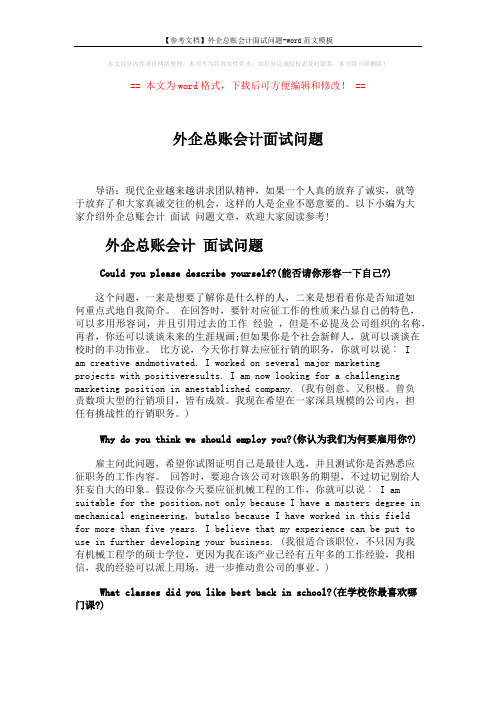
本文部分内容来自网络整理,本司不为其真实性负责,如有异议或侵权请及时联系,本司将立即删除!== 本文为word格式,下载后可方便编辑和修改! ==外企总账会计面试问题导语:现代企业越来越讲求团队精神,如果一个人真的放弃了诚实,就等于放弃了和大家真诚交往的机会,这样的人是企业不愿意要的。
以下小编为大家介绍外企总账会计面试问题文章,欢迎大家阅读参考!外企总账会计面试问题Could you please describe yourself?(能否请你形容一下自己?)这个问题,一来是想要了解你是什么样的人,二来是想看看你是否知道如何重点式地自我简介。
在回答时,要针对应征工作的性质来凸显自己的特色,可以多用形容词,并且引用过去的工作经验,但是不必提及公司组织的名称,再者,你还可以谈谈未来的生涯规画;但如果你是个社会新鲜人,就可以谈谈在校时的丰功伟业。
比方说,今天你打算去应征行销的职务,你就可以说︰ I am creative andmotivated. I worked on several major marketingprojects with positiveresults. I am now looking for a challenging marketing position in anestablished company. (我有创意、又积极。
曾负责数项大型的行销项目,皆有成效。
我现在希望在一家深具规模的公司内,担任有挑战性的行销职务。
)Why do you think we should employ you?(你认为我们为何要雇用你?)雇主问此问题,希望你试图证明自己是最佳人选,并且测试你是否熟悉应征职务的工作内容。
回答时,要迎合该公司对该职务的期望,不过切记别给人狂妄自大的印象。
假设你今天要应征机械工程的工作,你就可以说︰ I am suitable for the position,not only because I have a masters degree in mechanical engineering, butalso because I have worked in this fieldfor more than five years. I believe that my experience can be put to use in further developing your business. (我很适合该职位,不只因为我有机械工程学的硕士学位,更因为我在该产业已经有五年多的工作经验,我相信,我的经验可以派上用场,进一步推动贵公司的事业。
会计英语囗语面试题库及答案

会计英语囗语面试题库及答案会计英语口语面试题库及答案Introduction:Good morning, and welcome to our interview. We are pleased to have you here today to discuss your qualifications and experience in the field of accounting. Let's begin with some common questions that will help us understand yourproficiency in accounting English.Question 1:Can you explain the difference between "assets" and "liabilities" in accounting?Answer 1:In accounting, "assets" are resources controlled by a business that have future economic benefits. They are the things a company owns or is owed. On the other hand, "liabilities" are obligations or debts that a business owes to others. They represent the company's legal obligations to pay or perform services for another entity.Question 2:What is the purpose of a balance sheet and how does itreflect the financial position of a company?Answer 2:The balance sheet is a financial statement that provides asnapshot of a company's financial position at a specific point in time. It reflects the company's assets, liabilities, and equity. The fundamental accounting equation, Assets = Liabilities + Equity, is the basis for the balance sheet and shows how the company is financed and what it owns.Question 3:How would you describe the role of an "audit" in the context of accounting?Answer 3:An audit is an independent examination of a company's financial statements by a qualified auditor. It is conducted to provide an opinion on whether the financial statements are free from material misstatement and are presented fairly, in all material respects, in accordance with the applicable financial reporting framework.Question 4:Can you explain the term "depreciation" and why it is important?Answer 4:Depreciation is the systematic allocation of the cost of a tangible asset over its useful life. It is important because it reflects the wear and tear or consumption of the asset over time, which is essential for matching expenses with revenues and maintaining accurate financial records.Question 5:What do you understand by "cash flow" and why is it crucialfor a business?Answer 5:Cash flow refers to the inflow and outflow of cash and cash equivalents from a business. It is crucial because it indicates the liquidity of a business and its ability to generate enough cash to meet its financial obligations, such as paying debts, investing in operations, and distributing dividends.Question 6:How would you define "revenue recognition" in accounting?Answer 6:Revenue recognition is the process of accounting for revenue when it is earned by a company. It involves recognizing revenue in the accounting records when it is realized or realizable and earned. This is important for accurately reflecting the company's performance and financial health.Question 7:What is the role of "cost accounting" in a business?Answer 7:Cost accounting is the process of identifying, measuring, and recording the various costs incurred in the production of goods or services. It helps businesses understand the costs associated with their operations, make informed decisions about pricing, and control costs for improved profitability.Conclusion:Thank you for your detailed answers. We have a good understanding of your knowledge and skills in accounting English. We will be in touch with you shortly regarding the next steps in the interview process. Have a great day!。
会计面试题英文版及答案
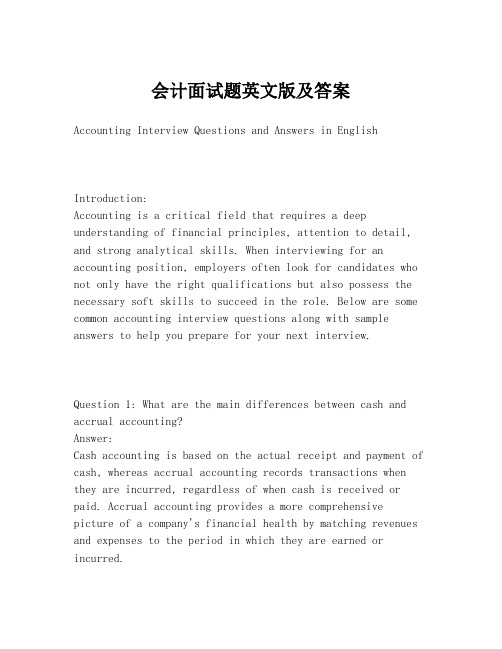
会计面试题英文版及答案Accounting Interview Questions and Answers in EnglishIntroduction:Accounting is a critical field that requires a deep understanding of financial principles, attention to detail, and strong analytical skills. When interviewing for an accounting position, employers often look for candidates who not only have the right qualifications but also possess the necessary soft skills to succeed in the role. Below are some common accounting interview questions along with sample answers to help you prepare for your next interview.Question 1: What are the main differences between cash and accrual accounting?Answer:Cash accounting is based on the actual receipt and payment of cash, whereas accrual accounting records transactions when they are incurred, regardless of when cash is received or paid. Accrual accounting provides a more comprehensivepicture of a company's financial health by matching revenues and expenses to the period in which they are earned or incurred.Question 2: How do you handle complex financial transactions? Answer:I approach complex financial transactions by breaking them down into smaller, manageable parts. I ensure that I understand the nature of the transaction, the parties involved, and the timing. I then apply the relevant accounting principles and standards, and document my process and rationale for future reference and audits.Question 3: What is your experience with financial statement analysis?Answer:I have extensive experience analyzing financial statements to assess a company's performance and financial health. I use various financial ratios and benchmarks to evaluate profitability, liquidity, solvency, and operational efficiency. This analysis helps in making informed decisions and identifying areas for improvement.Question 4: How do you ensure accuracy in your work? Answer:Accuracy is paramount in accounting. I ensure accuracy by double-checking my work, using reliable accounting software, and adhering to established procedures and controls. I also collaborate with my team for peer reviews and leveragetechnology for automated checks and balances.Question 5: Can you explain the importance of internal controls in an organization?Answer:Internal controls are essential for maintaining the integrity of financial reporting, preventing fraud, and ensuring compliance with laws and regulations. They help safeguard assets, promote operational efficiency, and provide a basis for reliable financial reporting.Question 6: How do you stay updated with the latest accounting standards and regulations?Answer:I stay updated by regularly attending professional seminars, participating in webinars, subscribing to industry publications, and engaging in continuous professional development. I also network with peers to exchange knowledge and insights.Question 7: Describe a challenging situation you faced in an accounting role and how you resolved it.Answer:In a previous role, I encountered a discrepancy in the monthly financial statements that required immediateattention. I identified the error, traced it back to its source, and corrected it promptly. I then worked with the team to implement additional checks to prevent similar issues in the future.Question 8: How do you manage your time effectively when dealing with multiple deadlines?Answer:I prioritize tasks based on their urgency and importance, and I create a schedule that allocates time for each task. I also use project management tools to track progress and ensurethat all deadlines are met. Communication with team members and stakeholders is key to managing expectations and ensuring timely completion of tasks.Conclusion:Preparing for an accounting interview involves understanding the technical aspects of the role as well as theinterpersonal skills required. Demonstrating your ability to handle complex situations, your knowledge of accounting principles, and your commitment to staying current with industry standards will help you stand out as a candidate. Remember to provide specific examples from your experience to illustrate your points effectively.。
会计英语知识面试题及答案
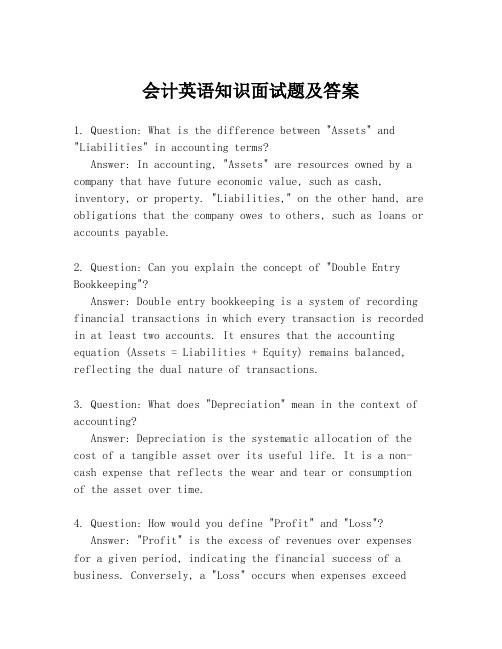
会计英语知识面试题及答案1. Question: What is the difference between "Assets" and "Liabilities" in accounting terms?Answer: In accounting, "Assets" are resources owned by a company that have future economic value, such as cash, inventory, or property. "Liabilities," on the other hand, are obligations that the company owes to others, such as loans or accounts payable.2. Question: Can you explain the concept of "Double Entry Bookkeeping"?Answer: Double entry bookkeeping is a system of recording financial transactions in which every transaction is recorded in at least two accounts. It ensures that the accounting equation (Assets = Liabilities + Equity) remains balanced, reflecting the dual nature of transactions.3. Question: What does "Depreciation" mean in the context of accounting?Answer: Depreciation is the systematic allocation of the cost of a tangible asset over its useful life. It is a non-cash expense that reflects the wear and tear or consumption of the asset over time.4. Question: How would you define "Profit" and "Loss"?Answer: "Profit" is the excess of revenues over expenses for a given period, indicating the financial success of a business. Conversely, a "Loss" occurs when expenses exceedrevenues, indicating a financial shortfall.5. Question: Explain the term "Balance Sheet".Answer: A balance sheet is a financial statement that presents a company's financial position at a specific point in time. It lists the company's assets, liabilities, and equity, and is structured to show that assets equalliabilities plus equity.6. Question: What is the purpose of "Auditing"?Answer: Auditing is the process of systematically examining and verifying an organization's financial records and accounts. It is performed to ensure accuracy, compliance with regulations, and to provide an independent assessment of the financial statements.7. Question: Can you describe the "Income Statement"?Answer: The income statement, also known as the profit and loss statement, is a financial report that shows a company's revenues, expenses, and profits or losses over a specific period of time.8. Question: What is the role of "Cash Flow" in accounting? Answer: Cash flow refers to the movement of cash in and out of a business. It is crucial for accounting as it indicates the liquidity of a company and its ability to pay debts, reinvest in the business, and pay dividends.9. Question: Explain the term "Accrual Accounting".Answer: Accrual accounting is a method of accounting where revenues and expenses are recorded when they are earned orincurred, not necessarily when cash is received or paid. This method provides a more accurate picture of a company's financial performance over time.10. Question: What is the difference between "GAAP" and "IFRS"?Answer: GAAP (Generally Accepted Accounting Principles) are the accounting standards used in the United States, while IFRS (International Financial Reporting Standards) are a set of global accounting standards. Both sets of standards aim to ensure consistency and comparability in financial reporting, but there are differences in specific accounting treatments and disclosure requirements.These interview questions and answers cover a range of fundamental accounting concepts and practices, which are essential for anyone seeking a career in accounting or finance.。
会计面试题英文翻译及答案
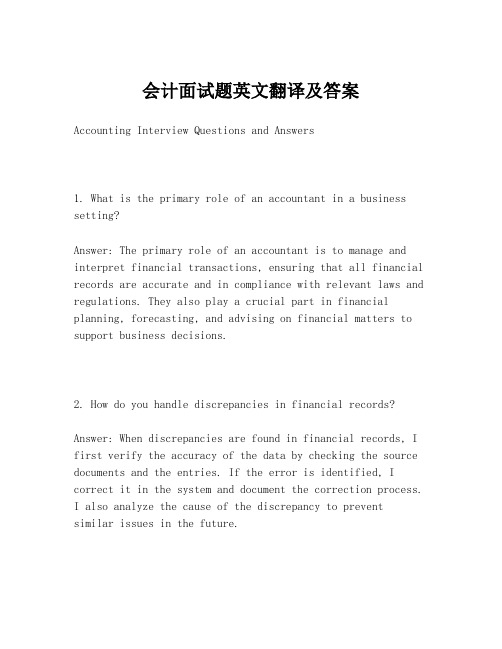
会计面试题英文翻译及答案Accounting Interview Questions and Answers1. What is the primary role of an accountant in a business setting?Answer: The primary role of an accountant is to manage and interpret financial transactions, ensuring that all financial records are accurate and in compliance with relevant laws and regulations. They also play a crucial part in financial planning, forecasting, and advising on financial matters to support business decisions.2. How do you handle discrepancies in financial records?Answer: When discrepancies are found in financial records, I first verify the accuracy of the data by checking the source documents and the entries. If the error is identified, I correct it in the system and document the correction process.I also analyze the cause of the discrepancy to preventsimilar issues in the future.3. What are the key financial statements, and what do they represent?Answer: The key financial statements include the Balance Sheet, Income Statement, Cash Flow Statement, and Statementof Changes in Equity. The Balance Sheet represents the company's financial position at a specific point in time, showing assets, liabilities, and equity. The Income Statement, also known as the Profit and Loss Statement, shows the company's revenues and expenses over a period, resulting inthe net profit or loss. The Cash Flow Statement illustratesthe inflows and outflows of cash, while the Statement of Changes in Equity details the changes in the equity accounts during the period.4. How do you ensure compliance with GAAP (Generally Accepted Accounting Principles)?Answer: To ensure compliance with GAAP, I stay updated withthe latest accounting standards and regulations. I applythese principles consistently in preparing financial statements and maintain proper documentation for all transactions. Additionally, I collaborate with auditors and other financial professionals to review and validate the accuracy and compliance of financial reporting.5. Can you explain the difference between accrual and cashbasis accounting?Answer: Accrual basis accounting records revenues and expenses when they are earned or incurred, regardless of when cash is received or paid. This method provides a more comprehensive picture of a company's financial performance over a period. On the other hand, cash basis accounting records transactions only when cash is exchanged, which can result in a less accurate reflection of the business's financial health, especially for businesses with significant credit sales or purchases.6. What is your experience with budgeting and financial forecasting?Answer: I have extensive experience in creating and managing budgets, as well as conducting financial forecasting. I use historical data, market trends, and business plans to project future financial performance. This process helps in strategic planning and decision-making, ensuring that the company is on track to meet its financial goals.7. How do you approach the task of auditing a company's financial records?Answer: When auditing a company's financial records, I start by understanding the company's operations and financialsystems. I then review the financial statements and underlying transactions to ensure they are accurate and comply with GAAP. I also look for any signs of fraud or errors and recommend corrective actions if necessary.8. What software and tools are you familiar with for accounting purposes?Answer: I am proficient in various accounting software and tools such as QuickBooks, Xero, SAP, and Microsoft Excel. These tools help in streamlining the accounting process, from recording transactions to generating financial reports.9. Can you describe a challenging situation you faced in your accounting career and how you resolved it?Answer: One challenging situation I encountered was identifying and correcting a complex error in a large set of financial records. I resolved it by working closely with the team, meticulously reviewing the data, and implementing a systematic approach to trace and correct the error. This experience reinforced the importance of attention to detail and effective communication in resolving accounting issues.10. How do you stay current with the latest accounting trendsand regulations?Answer: I stay current by participating in professional development courses, attending industry conferences, and being an active member of accounting associations. I also regularly read industry publications and follow updates from regulatory bodies to ensure my knowledge and practices are up to date.Conclusion:In conclusion, accounting is a dynamic field that requires continuous learning and adaptation to new regulations and technologies. As an accounting professional, I am committed to maintaining the highest standards of accuracy, compliance, and ethical practice to support the financial health of the organizations I work with.。
会计英文面试问题问答

会计英文面试问题问答1. Can you tell us about your experience in accounting?I have been working as an accountant for the past five years. I have experience in preparing financial statements, managing accounts payable and receivable, conducting internal audits, and ensuring compliance with financial regulations. I am proficient in using accounting software such as QuickBooks and have a strong understanding of generally accepted accounting principles.2. How do you handle tight deadlines and manage multiple tasks at once?I prioritize my tasks based on urgency and importance. I create a schedule or to-do list to stay organized and ensure that all tasks are completed on time. I also communicate and collaborate with team members to delegate tasks and support each other in meeting deadlines.3. How do you stay updated on the latest accounting regulations and industry trends?I regularly attend professional development seminars and workshops related to accounting. I also subscribe to accounting publications and newsletters to stay informed about the latest regulations and trends. Additionally, I participate in online forums and networking events to discuss and learn from other professionals in the field.4. Can you give an example of a time when you identified a financial discrepancy and how you resolved it?In my previous role, I noticed a discrepancy in the accounts receivable balance. After further investigation, I discovered anerror in recording a sales transaction, resulting in an overstated balance. To resolve the issue, I traced the error back to its source, corrected the entry, and adjusted the accounts receivable balance accordingly. I also implemented additional checks and controls to prevent similar errors in the future.5. How do you communicate financial information to non-financial stakeholders?I believe in presenting financial information in a clear and understandable manner. I avoid using complex jargon and explain concepts in layman's terms. Visual aids such as charts and graphs can also be helpful in presenting data. I encourage questions and discussions to ensure that non-financial stakeholders have a thorough understanding of the financial information presented.6. How do you handle confidential financial information?I understand the importance of maintaining confidentiality in accounting. I follow strict protocols to ensure that sensitive financial information is securely stored and accessed only by authorized personnel. I am familiar with data protection laws and regulations and strictly adhere to them to safeguard financial information.7. What is your approach to improving efficiency in accounting processes?I believe in adopting automation and technology to streamline accounting processes. This includes implementing accounting software, developing standardized templates and procedures, and utilizing electronic filing systems. I also regularly review and analyze existing processes to identify areas for improvement andmake necessary changes to increase efficiency.8. How do you handle difficult conversations with clients or colleagues?I approach difficult conversations with empathy and respect. I tryto understand the other person's perspective and actively listen to their concerns. I remain calm and composed, focusing on finding a solution rather than placing blame. I strive to maintain open and honest communication, and I am always willing to compromise and find common ground.9. How do you ensure accuracy and attention to detail in your work?I pay close attention to detail in all aspects of my work. I double-check my calculations and review my work before submitting it. I am also proactive in seeking feedback from colleagues or supervisors to ensure accuracy. Additionally, I am continuously improving my skills and knowledge through ongoing education and professional development to further enhance my accuracy and attention to detail.10. Why did you choose a career in accounting?I have always had a passion for numbers and problem-solving. Accounting provides me with the opportunity to work with numbers and financial data in a structured and analytical manner. It also offers a stable and rewarding career path with opportunitiesfor growth and advancement. I enjoy the challenge of ensuring financial accuracy and compliance, and I find satisfaction in helping businesses make informed financial decisions.。
六个会计英文面试问题
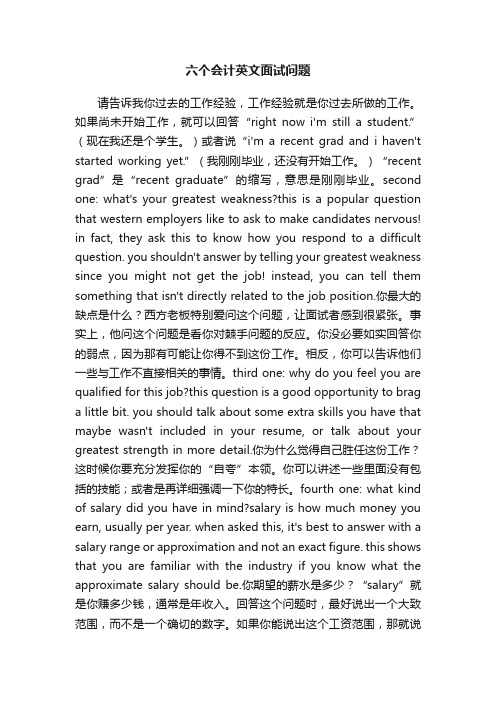
六个会计英文面试问题请告诉我你过去的工作经验,工作经验就是你过去所做的工作。
如果尚未开始工作,就可以回答“right now i'm still a student.”(现在我还是个学生。
)或者说“i'm a recent grad and i haven't started working yet.”(我刚刚毕业,还没有开始工作。
)“recent grad”是“recent graduate”的缩写,意思是刚刚毕业。
second one: what's your greatest weakness?this is a popular question that western employers like to ask to make candidates nervous! in fact, they ask this to know how you respond to a difficult question. you shouldn't answer by telling your greatest weakness since you might not get the job! instead, you can tell them something that isn't directly related to the job position.你最大的缺点是什么?西方老板特别爱问这个问题,让面试者感到很紧张。
事实上,他问这个问题是看你对棘手问题的反应。
你没必要如实回答你的弱点,因为那有可能让你得不到这份工作。
相反,你可以告诉他们一些与工作不直接相关的事情。
third one: why do you feel you are qualified for this job?this question is a good opportunity to brag a little bit. you should talk about some extra skills you have that maybe wasn't included in your resume, or talk about your greatest strength in more detail.你为什么觉得自己胜任这份工作?这时候你要充分发挥你的“自夸”本领。
会计英语面试题目及答案

会计英语面试题目及答案1. Question: What is the difference between "bookkeeping" and "accounting"?Answer: Bookkeeping is the process of recording financial transactions, while accounting is the broader practice of analyzing, summarizing, and reporting these transactions to present financial statements.2. Question: Can you explain the term "double-entry bookkeeping"?Answer: Double-entry bookkeeping is a system where every financial transaction is recorded in at least two different accounts. It ensures that the accounting equation (Assets = Liabilities + Equity) remains balanced.3. Question: What are the main components of a balance sheet? Answer: The main components of a balance sheet are assets, liabilities, and equity. Assets represent what a company owns, liabilities represent what a company owes, and equity represents the owner's claim on the company's net assets.4. Question: How do you calculate the net income of a company? Answer: Net income is calculated by subtracting all expenses from the total revenue of the company. It represents the profit earned by the company during a specific period.5. Question: What is the purpose of depreciation in accounting?Answer: Depreciation is the systematic allocation of the cost of a tangible asset over its useful life. It is used to match the expense of using the asset with the revenue it generates over time.6. Question: Explain the term "cash flow".Answer: Cash flow refers to the inflow and outflow of cash in a business. Positive cash flow indicates that a business is generating more cash than it is spending, while negative cash flow indicates the opposite.7. Question: What is the role of an auditor in a company?Answer: An auditor's role is to provide an independent assessment of a company's financial statements to ensure they are accurate, complete, and comply with accounting standards and regulations.8. Question: How would you handle a situation where there isa discrepancy in the financial records?Answer: In such a situation, I would first identify the nature and extent of the discrepancy. Then, I would investigate the possible causes, correct the error, and update the records accordingly. If necessary, I would also consult with senior management or the audit team.9. Question: What is the importance of ethical behavior in accounting?Answer: Ethical behavior in accounting is crucial for maintaining trust and integrity in financial reporting. It ensures that financial information is accurate, reliable, and unbiased, which is essential for stakeholders to makeinformed decisions.10. Question: Can you describe the process of budgeting?Answer: Budgeting is the process of estimating and planning for a company's future financial needs. It involves setting financial goals, allocating resources, and monitoring actual performance against the budget to manage and control expenses.。
- 1、下载文档前请自行甄别文档内容的完整性,平台不提供额外的编辑、内容补充、找答案等附加服务。
- 2、"仅部分预览"的文档,不可在线预览部分如存在完整性等问题,可反馈申请退款(可完整预览的文档不适用该条件!)。
- 3、如文档侵犯您的权益,请联系客服反馈,我们会尽快为您处理(人工客服工作时间:9:00-18:30)。
总账会计面试英语面试最喜欢问的问题:首先,自我介绍1、请你自我介绍一下你自己,回答提示:一般人回答这个问题过于平常,只说姓名、年龄、爱好、工作经验,这些在简历上都有,其实,企业最希望知道的是求职者能否胜任工作,包括:最强的技能、最深入研究的知识领域、个性中最积极的部分、做过的最成功的事,主要的成就等,这些都可以和学习无关,也可以和学习有关,但要突出积极的个性和做事的能力,说得合情合理企业才会相信。
企业很重视一个人的礼貌,求职者要尊重考官,在回答每个问题之后都说一句“谢谢”。
企业喜欢有礼貌的求职者。
英语自我介绍- Bachelor's degree or above in tax, accounting, finance, law or other related disciplines - Professional accounting qualification or PRC registered tax agent or lawyer is a plus - Over 3 years experience in tax function with CPA firms(Big 4 experience is preferred), law firms or tax authorities- Good understanding of tax policies, rules and regulations- Strong analytical and highly commitment to quality client service- Be mature, proactive, motivated with strong sense of teamwork- Good sense of business, consultation skills, communication skills, self-initiation, teamwork spirit and willingness to work under pressure- Excellent written and oral communication skills in both English and Mandarin Chinese, including both technical and business writing, documentation and presentation skills - Willing to travel2、你觉得你个性上最大的优点是什么?回答提示:沉着冷静、条理清楚、立场坚定、顽强向上。
乐于助人和关心他人、适应能力和幽默感、乐观和友爱。
我曾在某某公司工作过五年,加上实习工作,使我适合这份工作。
我相信我能成功。
3、说说你最大的缺点?回答提示:这个问题企业问的概率很大,通常不希望听到直接回答的缺点是什么等,如果求职者说自己小心眼、爱忌妒人、非常懒、脾气大、工作效率低,企业肯定不会录用你。
绝对不要自作聪明地回答“我最大的缺点是过于追求完美”,有的人以为这样回答会显得自己比较出色,但事实上,他已经岌芨可危了。
企业喜欢求职者从自己的优点说起,中间加一些小缺点,最后再把问题转回到优点上,突出优点的部分。
企业喜欢聪明的求职者。
4、你对加班的看法?回答提示:实际上好多公司问这个问题,并不证明一定要加班。
只是想测试你是否愿意为公司奉献。
回答样本:如果是工作需要我会义不容辞加班。
我现在单身,没有任何家庭负担,可以全身心的投入工作。
但同时,我也会提高工作效率,减少不必要的加班5、你对薪资的要求?回答提示:如果你对薪酬的要求太低,那显然贬低自己的能力;如果你对薪酬的要求太高,那又会显得你分量过重,公司受用不起。
一些雇主通常都事先对求聘的职位定下开支预算,因而他们第一次提出的价钱往往是他们所能给予的最高价钱。
他们问你只不过想证实一下这笔钱是否足以引起你对该工作的兴趣。
回答样本一:“我对工资没有硬性要求。
我相信贵公司在处理我的问题上会友善合理。
我注重的是找对工作机会,所以只要条件公平,我则不会计较太多回答样本二:我受过系统的会计专业的训练,不需要进行大量的培训。
而且我本人也对会计工作特别感兴趣。
因此,我希望公司能根据我的情况和市场标准的水平,给我合理的薪水。
回答样本三:如果你必须自己说出具体数目,请不要说一个宽泛的范围,那样你将只能得到最低限度的数字。
最好给出一个具体的数字,这样表明你已经对当今的人才市场作了调查,知道像自己这样学历的雇员有什么样的价值。
6、在五年的时间内,你的职业规划?回答提示:这是每一个应聘者都不希望被问到的问题,但是几乎每个人都会被问到。
比较多的答案是“管理者”。
但是近几年来,许多公司都已经建立了专门的技术途径。
这些工作地位往往被称作“中级财务会计师”、“高级财务会计师”“注册会计师”或等等。
当然,说出其他一些你感兴趣的职位也是可以的,比如产品销售部经理,生产部经理等一些与你的专业有相关背景的工作。
要知道,考官总是喜欢有进取心的应聘者,此时如果说“不知道”,或许就会使你丧失一个好机会。
最普通的回答应该是“我准备在技术领域有所作为”或“我希望能按照公司的管理思路发展”。
其次,介绍一下你以前的工作内容再次,你对面试公司的了解情况1、你还有什么问题要问吗?回答提示:企业的这个问题看上去可有可无,其实很关键,企业不喜欢说“没有问题”的人,因为其很注重员工的个性和创新能力。
企业不喜欢求职者问个人福利之类的问题,如果有人这样问:贵公司对新入公司的员工有没有什么培训项目,我可以参加吗?或者说贵公司的晋升机制是什么样的?企业将很欢迎,因为体现出你对学习的热情和对公司的忠诚度以及你的上进心。
2、工作中你难以和同事、上司相处,你该怎么办?回答提示:①我会服从领导的指挥,配合同事的工作。
②我会从自身找原因,仔细分析是不是自己工作做得不好让领导不满意,同事看不惯。
还要看看是不是为人处世方面做得不好。
如果是这样的话我会努力改正。
③如果我找不到原因,我会找机会跟他们沟通,请他们指出我的不足。
有问题就及时改正。
④作为优秀的员工,应该时刻以大局为重,即使在一段时间内,领导和同事对我不理解,我也会做好本职工作,虚心向他们学习,我相信,他们会看见我在努力,总有一天会对我微笑的!以前工作内容描述Requirments:•College/University degree major in Accounting with business administration background专科或本科学历,会计专业或具有企业管理背景•3-5 years experience in related field with a multinational company在跨国公司相关岗位3-5年的经验•Independent, systematic, logical and hard working, responsible and mature独立、系统、合规和认真工作,要有责任感和稳重性•Good command of English; Good in using MS office software package良好的英语能力,熟练使用办公系统软件•Familiar with ERP system, SAP is a plus熟悉ERP 系统,具SAP经验者尤佳Responsibilities:1. Monthly closing 月度结算•Ensure all costs and expenses are booked correctly and timely确保将所有的成本和费用进行正确及时的计入账簿•Responsible for running month-end closing program in SAP负责在SAP系统中进行月末结算项目•BS and P&L review with Head of Finance and GM at the 3rd working day every month 在每月的第三个工作日和财务负责人和总经理对BS and P&L进行评估•Prepare monthly reporting package and distribute to HO准备各个项目的月报表,并分送到总部2. Fixed assets management 固定资产管理•Create Internal order in SAP according to approved CPI依据已核准的CPI在SAP中建立内部顺序和规则•Check and control SAP fixed asset depreciation according to IFRS and Chinese regulations依据IFRS 和中国法规来检查和控制 SAP 中固定资产的折旧•Maintain fixed asset investment budget procedures (Capex report)维护和控制固定资产投资预算的程序(Capex 报告)3. Tax税务•Issue VAT tax invoices / export invoices in golden tax system after billin 付款后在金税系统中开具增值税发票/出口发票•VAT invoices verification增值税发票审核和认证•Monthly Tax declaration每月的税务申报•Quarterly CIT declaration季度的CIT 申报4. Bookkeeping 记账•Daily voucher posting in SAP在SAP中每天的凭证记载和保管•Prepare payment proposal准备付款的申请。
